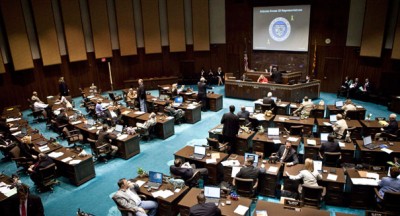
Arizona House
A movement for a constitutional convention or “Convention of States” is gaining ground and igniting controversy across the nation.
The lower houses of Alaska and Arizona passed resolutions calling for such a convention on March 12, days after Georgia became the first state officially to pass such a resolution.
Supporters want to call all the states together to pass a constitutional amendment limiting the federal government. Article Five of the US Constitution says a constitutional convention must be called if 34 states petition for it.
Among supporters’ goals: a balanced budget amendment.
“There is a high probability that proponents of the balanced budget amendment will gain the support from additional states required to reach the requisite two-thirds over the next several legislative sessions,” former University of Colorado Economics Professor Barry W. Poulson wrote in a recent Forbes editorial. “A successful Article V convention to propose a balanced budget amendment would then set a precedent for subsequent amendment conventions.”
Supporters believe that such a convention is the only way to get a balanced budget amendment added to the constitution.
Resolutions passed the Arizona House, 32-25 and the Alaska House, 24-13.
“We’re one step closer to halting the massive federal bureaucracy and allowing families and individuals the opportunity to control their own lives,” said Yale Wishnick, the state director for the Arizona Convention of States Project.
Support is growing
Resolutions demanding an Article V convention have been introduced in 21 states, Poulson noted. The resolutions are supported by an organization called Citizens for Self-Governance which is promoting a Convention of States Project. Among the other states that have introduced such a resolution: Wisconsin, Georgia, Arizona, Kentucky, Idaho, Michigan, Oklahoma, South Carolina, Utah, Tennessee, West Virginia, South Dakota and Virginia.
Poulson didn’t say what the other states are but new stories indicate that such resolutions have been introduced in Louisiana, Florida and Illinois. In Arizona and Alaska the resolution will have to pass the state senates in order to become official.
Story continues below video.
“Basically, this a way for the people through the state legislatures to have a voice on what’s happened in Washington, DC,” Louisiana state Representative Ray Garofalo (R-Chalmette), who is supporting the resolution there, said of the convention. He described the convention as having three purposes:
“No. 1, to limit the size and scope of the federal government” Garofalo told a TV station. “No. 2, to put a limit on spending. The federal government is spending way too much money. No. 3, to impose term limits on our federal elected representatives.”
Opposition to the convention among liberals and conservatives
Neil Sroka of the liberal group Democracy for America described the convention as something that “that no progressive organization or group of individuals is advocating in any way.”
Story continues below video.
“To call this a nonpartisan approach, when every single person involved in propagating this is a right-wing conservative, is kind of ridiculous,” Sroka said. “It’s just funny that the individuals who run around the country wearing Uncle Sam costumes and preaching the love of the Constitution actually want to go ahead and potentially erode the rights that are already laid out in the Constitution.”
Some conservatives share Sroka’s opinion of the Convention of the States and his belief that it is a threat to constitutional liberties. The John Birch Society is organizing opposition to the Convention.
Two debates between Convention of States Project Director Michael Farris and Oklahoma Convention sponsor State Sen. Rob Standridge (R-Norman) and representatives of the John Birch Society took place this week. The first was held at the Olivet Baptist Church in Oklahoma City Wednesday, and the second at the First Assembly of God Church in Norman on Thursday.
Sign up for Off The Grid News’ weekly email and stay informed about the issues important to you
 Off The Grid News Better Ideas For Off The Grid Living
Off The Grid News Better Ideas For Off The Grid Living



